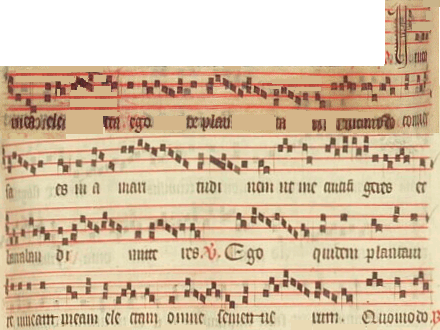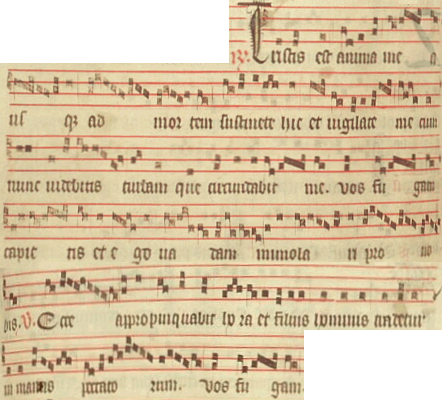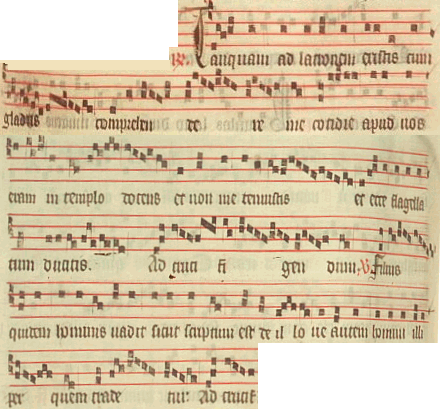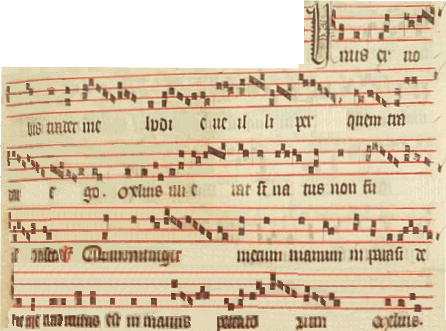READINGS: LENT MONDAY VI

Invitatory Psalm & BACK
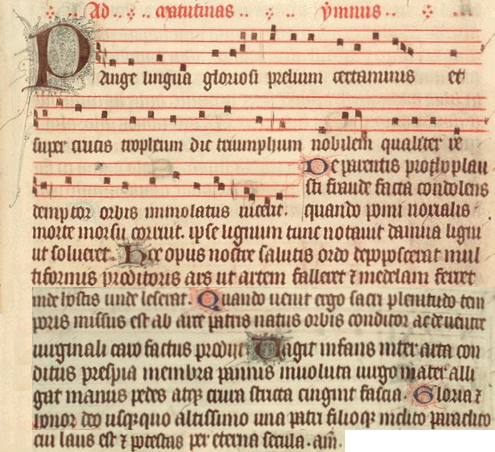
PSALMS and BACK
κἀγὼ ἐὰν ὑψωθῶ ἐκ τῆς γῆς, — πάντας ἑλκύσω πρὸς ἐμαυτόν.
Even Years: Jeremiah 11:18—12:13 18 וַיהוָה
הוֹדִיעַנִי
וָאֵדָעָה
אָז הִרְאִיתַנִי
מַעַלְלֵיהֶם׃
| 18 Yahweh informed me and I knew it; you then revealed their scheming to me. 19 I for my part was like a trustful lamb being led to the slaughterhouse, not knowing the schemes they were plotting against me, 'Let us destroy the tree in its strength, let us cut him off from the land of the living, so that his name may no longer be remembered!' 20 Yahweh Sabaoth, whose judgement is upright, tester of motives and thoughts, I shall see your vengeance on them, for I have revealed my cause to you. 21 Against the people of Anathoth who are determined to kill me and say to me, 'Do not prophesy in the name of Yahweh or you will die at our hands!' 22 Yahweh says this, 'I am about to punish them. Their young people will die by the sword, their sons and daughters by famine. 23 Not one will be left when I bring disaster on the people of Anathoth, when the year for punishing them comes.' 12:1 Your uprightness is too great, Yahweh, for me to dispute with you. But I should like to discuss some points of justice with you: Why is it that the way of the wicked prospers? Why do all treacherous people thrive? 2 You plant them, they take root, they flourish, yes, and bear fruit. You are on their lips, yet far from their heart. 3 You know me, Yahweh, you see me, you probe my heart, which is close to yours. Drag them off like sheep for the slaughterhouse, reserve them for the day of butchery. 4 (How long will the land be in mourning, and the grass wither all over the countryside? The animals and birds are dying as a result of the wickedness of the inhabitants.) For they say, 'God does not see our fate.' 5 'If you find it exhausting to race against me on foot, how will you compete against horses? In a country at peace you feel secure, but how will you fare in the thickets of the Jordan? 6 'For even your brothers and your own family will betray you. They will pursue you in full cry. Put no faith in them when they speak you fair!' 7 I have abandoned my house, left my heritage, I have delivered what I dearly loved into the clutches of its enemies. 8 To me, my heritage has behaved like a lion in the forest, it roared at me ferociously: so I now hate it. 9 I see my heritage as a brightly-coloured bird of prey attacked by birds of prey on every side! Go, assemble all the wild animals, make them come and dine! 10 Many shepherds have laid my vineyard waste, have trampled over my plot of land, the plot of land which was my joy, reducing my favourite estate to a deserted wilderness. 11 They have made it a waste; wasted, it mourns before me. The whole country has been devastated and no one takes it to heart. 12 The devastators have arrived on all the bare heights of the desert (for Yahweh wields a devouring sword); from one end of the country to the other, there is no peace for any living thing. 13 Wheat they have sown, thorns they reap: they have worn themselves out, to no profit. They are disappointed in their harvests, because of Yahweh's burning anger. |
Odd Years: Isaiah 52:13—53:12 13 הִנֵּה
יַשְׂכִּיל
עַבְדִּי
יָרוּם
וְנִשָּׂא
וְגָבַהּ
מְאֹד׃
| 13 Look, my servant will prosper, will grow great, will rise to great heights. 14 As many people were aghast at him —he was so inhumanly disfigured that he no longer looked like a man— 15 so many nations will be astonished and kings will stay tight-lipped before him, seeing what had never been told them, learning what they had not heard before. 53:1 Who has given credence to what we have heard? And who has seen in it a revelation of Yahweh's arm? 2 Like a sapling he grew up before him, like a root in arid ground. He had no form or charm to attract us, no beauty to win our hearts; 3 he was despised, the lowest of men, a man of sorrows, familiar with suffering, one from whom, as it were, we averted our gaze, despised, for whom we had no regard. 4 Yet ours were the sufferings he was bearing, ours the sorrows he was carrying, while we thought of him as someone being punished and struck with affliction by God; 5 whereas he was being wounded for our rebellions, crushed because of our guilt; the punishment reconciling us fell on him, and we have been healed by his bruises. 6 We had all gone astray like sheep, each taking his own way, and Yahweh brought the acts of rebellion of all of us to bear on him. 7 Ill-treated and afflicted, he never opened his mouth, like a lamb led to the slaughter-house, like a sheep dumb before its shearers he never opened his mouth. 8 Forcibly, after sentence, he was taken. Which of his contemporaries was concerned at his having been cut off from the land of the living, at his having been struck dead for his people's rebellion? 9 He was given a grave with the wicked, and his tomb is with the rich, although he had done no violence, had spoken no deceit. 10 It was Yahweh's good pleasure to crush him with pain; if he gives his life as a sin offering, he will see his offspring and prolong his life, and through him Yahweh's good pleasure will be done. 11 After the ordeal he has endured, he will see the light and be content. By his knowledge, the upright one, my servant will justify many by taking their guilt on himself. 12 Hence I shall give him a portion with the many, and he will share the booty with the mighty, for having exposed himself to death and for being counted as one of the rebellious, whereas he was bearing the sin of many and interceding for the rebellious. |
Even Years: Leo the Great, Sermon 71, on the Resurrection, 1-2 (CCL 138A, 434-436)
|
Odd Years: Origen, Homily 10 on Jeremiah, 1-3 (PG 13, 358-362) εἶτα ὁ σωτὴρ ἐν τῷ προφήτῃ ἴδωμεν τίνα λέγει· Ἐγὼ ὡς ἀρνίον ἄκακον ἀγόμενον τοῦ θύεσθαι οὐκ ἔγνων. Ἐπ' ἐμὲ ἐλογίσαντο λογισμόν, λέγοντες· δεῦτε καὶ ἐμβάλωμεν ξύλον εἰς τὸν ἄρτον αὐτοῦ, καὶ ἐκτρίψωμεν αὐτὸν ἀπὸ γῆς ζώντων, καὶ τὸ ὄνομα αὐτοῦ οὐ μὴ μνησθῇ ἔτι· ὡς φησὶν καὶ ὁ προφήτης Ἡσαΐας, Χριστὸς ὡς πρόβατον ἐπὶ σφαγὴν ἤχθη, καὶ ὡς ἀμνὸς ἐναντίον τοῦ κείραντος ἄφωνος, οὕτως οὐκ ἀνοίγει τὸ στόμα αὐτοῦ. Ἐκεῖ μὲν οὖν περὶ αὐτοῦ Ἡσαΐας λέγει, ἐνταῦθα δὲ ὁ Χριστὸς περὶ αὑτοῦ· Ἐγὼ φησὶν ὡς ἀρνίον ἄκακον ἐπὶ σφαγὴν ἀγόμενον τοῦ θύεσθαι οὐκ ἔγνων. Οὐκ εἶπεν τί οὐκ ἔγνω. Οὐ γὰρ εἴρηκεν· οὐκ ἔγνων κακά, οὐκ εἴρηκεν· οὐκ ἔγνων ἀγαθά, οὔτε εἴρηκεν· οὐκ ἔγνων ἁμαρτίαν, ἀλλ' ἁπλῶς οὐκ ἔγνων. Σοὶ οὖν καταλέλοιπεν ἐξετάζειν τί οὐκ ἔγνω, καὶ μάνθανε τί οὐκ ἔγνω ἀπὸ τοῦ τὸν μὴ γνόντα ἁμαρτίαν ὑπὲρ ἡμῶν ἁμαρτίαν ἐποίησεν... Ἐπ' ἐμὲ ἐλογίσαντο λογισμόν, λέγοντες· δεῦτε καὶ ἐμβάλωμεν ξύλον εἰς τὸν ἄρτον αὐτοῦ... Ὁ τοῦ Ἰησοῦ ἄρτος ὁ λόγος ἐστὶν ἐν ᾧ τρεφόμεθα. Ἐπεὶ τοίνυν διδάσκοντος αὐτοῦ ἐν τῷ λαῷ ἠθέλησαν τὸ σκάνδαλον ἐν τῇ διδασκαλίᾳ αὐτοῦ προσθεῖναι διὰ τοῦ σταυρῶσαι αὐτόν, εἶπον· Βάλωμεν ξύλον εἰς τὸν ἄρτον αὐτοῦ· ὅταν γὰρ τῷ λόγῳ τῆς Ἰησοῦ διδασκαλίας προσάπτηται τὸ ἐσταυρῶσθαι τὸν διδάσκαλον, εἰς τὸν ἄρτον αὐτοῦ ξύλον ἐμβέβληται. Ἐκεῖνοι μὲν οὖν ἐξ ἐπιβουλῆς βουλευσάμενοι λεγέτωσαν· Δεῦτε καὶ ἐμβάλωμεν ξύλον εἰς τὸν ἄρτον αὐτοῦ· ἐγὼ δὲ παραδοξότερον ἐρῶ· τὸ ξύλον ἐμβληθὲν εἰς τὸν ἄρτον αὐτοῦ κρείττονα τὸν ἄρτον πεποίηκεν. Παράδειγμα λαμβάνω ἀπὸ τοῦ Μωσέως νόμου· τὸ ξύλον βληθὲν εἰς τὸ πικρὸν ὕδωρ ἐποίησεν αὐτὸ γλυκύ· οὕτως τὸ ξύλον τοῦ πάθους Ἰησοῦ Χριστοῦ ἐλθὸν εἰς τὸν λόγον πεποίηκεν τὸν ἄρτον αὐτοῦ γλυκύτερον. Πρὶν ἔλθῃ γοῦν εἰς τὸν ἄρτον αὐτοῦ τὸ ξύλον, ὅτε ἄρτος μόνον ἦν καὶ ξύλον οὐκ ἦν ἐν τῇ διδασκαλίᾳ αὐτοῦ, εἰς πᾶσαν τὴν γῆν οὐκ ἐξῆλθεν ὁ φθόγγος αὐτοῦ· ἀλλ' ἐπεὶ προσέλαβεν δύναμιν ὁ ἄρτος διὰ τοῦ ξύλου τοῦ βληθέντος εἰς αὐτόν, διὰ τοῦτο ὁ λόγος τῆς διδασκαλίας αὐτοῦ νενέμηται ὅλην τὴν οἰκουμένην... ἐγὼ γὰρ λέγω ὅτι ὁ νόμος μὴ νοούμενος πικρὸν ὕδωρ ἐστίν, ἐὰν δὲ ἔλθῃ τὸ ξύλον Ἰησοῦ καὶ ἡ διδασκαλία τοῦ σωτῆρός μου ἐπιδημήσῃ, γλυκάζεται καὶ ἥδιστος γίνεται ὁ Μωσέως νόμος ἀναγινωσκόμενος καὶ γινωσκόμενος... Οὕτως αὐτὸν ἀπέκτειναν, ὡς ἐξαφανίζοντες αὐτοῦ τὸ ὄνομα. Ἀλλὰ ὁ Ἰησοῦς οἶδεν πῶς ἀποθνῄσκει καὶ διὰ τί· διό φησιν· Ἐὰν μὴ ὁ κόκκος τοῦ σίτου πεσὼν εἰς τὴν γῆν ἀποθάνῃ, αὐτὸς μόνος μένει· ἐὰν δὲ ἀποθάνῃ, πολὺν καρπὸν φέρει· ὥστε ὁ θάνατος τοῦ Ἰησοῦ στάχυς σίτου γίνεται ποιῶν πολλαπλασίονα καὶ πολύχουν τὸ ἐσπαρμένον, ὡς εἰ καθ' ὑπόθεσιν μὴ ἐσταύρωτο μηδὲ τεθνήκει, ἔμεινεν ἂν μόνος ὁ κόκκος τοῦ σίτου, καὶ πολλοὶ οὐκ ἐγένοντο ἐξ αὐτοῦ. Πρόσχες οὖν αὐτοῦ τῇ λέξει, εἰ μὴ τοῦτο βεβούληται λέγων· Ὁ κόκκος τοῦ σίτου ἐὰν μὴ πεσὼν εἰς τὴν γῆν ἀποθάνῃ, αὐτὸς μόνος μένει· ἐὰν δὲ ἀποθάνῃ, πολὺν καρπὸν φέρει· ὁ θάνατος τοῦ Ἰησοῦ τούτους πάντας ἐκαρποφόρησεν· εἰ δὲ ὁ θάνατος τοσούτους ἐκαρποφόρησε, πόσους καρποφορήσει ἡ ἀνάστασις; |
| Prayer |
